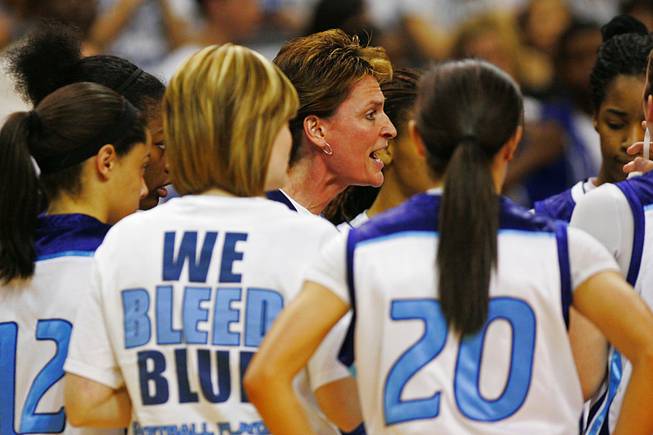
Sam Morris / Las Vegas Sun
Centennial coach Karen Weitz talks to her team during the second half of their game against Liberty in the girl’s state basketball championship game Friday, February 25, 2011. Centennial won in overtime 71-65.
Wednesday, Oct. 5, 2011 | 2 a.m.
Related coverage
Karen Weitz can’t help feeling this rule was created partially with her Centennial High School girls basketball team in mind.
The Nevada Interscholastic Activities Association’s Board of Control Monday approved a mercy rule for Nevada high school basketball games, which calls for a running clock when one team is ahead by 40 or more points in the second half. To be implemented this winter, the clock would only stop for timeouts and continue to run during fouls shots — comparable to a recreation-league game where teams have the court for one-hour blocks.
While Weitz isn’t crazy about a mercy rule idea, it sure beats the alternative of last year’s system for handling blowouts. The NIAA, which governs high school sports in Nevada, issued a warning to coaches that threatened suspension for victories of more than 50 or more points.
“It is good because it takes the pressure off the team doing the scoring that they won’t be hit with consequences like before,” Weitz said of the rule. “I don’t think it will alter our game. My kids are still going to play hard.”
Centennial was relatively unchallenged last year until deep into the postseason, winning 13 games by 50 or more points in capturing the large-school classification state title for the sixth time in 10 years.
Against Arbor View, Centennial didn’t give up any points in the second half in winning 75-8. They also surrendered eight points in an 81-8 win against Chaparral.
With each lopsided victory, Weitz knew there would be a process of explaining the imbalance, including providing game film as evidence. Whenever games got close to hitting the 50-point plateau, Weitz had to be on guard knowing officials could misinterpret the outcome and suspend her.
It made for one of the longest coaching seasons of her life.
“I see both sides of it, but fewer and fewer people want to see my side,” Weitz said. “People who weren’t even at our game would accuse us of running up the score just from hearing the final or seeing the box score. Our word didn’t mean anything until we were able to show (officials) proof (through game film).
“It’s a catch-22,” she continued. “If we dribble the ball down the court and dribble around (to let the clock run out), then we are mocking you. If we pass the ball 15 times before shooting, then we are mocking. It became a no-win situation.”
Weitz remembers years when her team was on the wrong end of the lopsided defeats. When Centennial won its first state title in 2002, Southern Nevada teams hadn’t won a championship in 22 years. Most seasons, they didn’t even win a game at the state tournament, and were soundly defeated.
“When Reno teams were beating us by 30 or 40 points, was anyone coming to our aid?,” she said.
So, Weitz made her program mirror those of Northern Nevada, becoming one of the area’s first teams to play the sport year-round. Hence, the lopsided victories.
“I totally learned from those Reno coaches. I had so much respect for what they were doing,” she said.
In the second game of last season, the Palo Verde High boys team was beaten 102-52 by eventual state champion Canyon Springs. It was the largest margin of defeat in coach Jermone Riley’s playing and coaching career.
Looking back on the humbling experience, Riley said he wouldn’t change a thing. His team eventually had an 11-game winning streak and reached the Sunset Regional championship game largely because they were able to fix weaknesses exposed in the blowout defeat.
“I respect any rule the NIAA establishes for our basketball community, but I do feel like it takes a little bit away from the game,” Riley said. “A 40-point loss, especially early in the season, makes my team better. You always take it as a learning experience and want to have the opportunity to make adjustments.”
Palo Verde’s early season struggles last year were credited to the fact Riley had 11 first-year varsity players on the roster. But at other schools, those struggles never go away, which NIAA officials say makes the mercy rule a must. The rule was passed with no written objection and most of the feedback was positive, said Donnie Nelson, the NIAA's assistant director.
After a 40-point lead is reached, Nelson said, the clock would only stop for injuries, timeouts and technical fouls. It would continue running for foul shots and out-of-bounds plays. Also, if the trailing team brings its deficit to less than 40 points, the clock would still run continuously. In football, the running clock begins when a team is ahead by 45 or more points, but it is stopped if a team brings its deficit to less than 45.
Weitz and Riley — two of the valley’s most respected coaches — say the general rule of thumb when severely overmatching an opponent is to first stop with the full court press. But, by no means, does that mean stop playing.
“You always are going to ask your guys to be competing and playing hard,” Riley said. “I mean, we are talking about varsity sports. There is always going to be a level of respect for the other team, but you still have to allow your kids the chance to compete.”

Join the Discussion:
Check this out for a full explanation of our conversion to the LiveFyre commenting system and instructions on how to sign up for an account.
Full comments policy